The AMD Ryzen 5 1600X vs Core i5 Review: Twelve Threads vs Four at $250
by Ian Cutress on April 11, 2017 9:00 AM ESTBenchmarking Performance: CPU Office Tests
The office programs we use for benchmarking aren't specific programs per-se, but industry standard tests that hold weight with professionals. The goal of these tests is to use an array of software and techniques that a typical office user might encounter, such as video conferencing, document editing, architectural modelling, and so on and so forth. At present we have two such tools to use.
PCMark8
Despite originally coming out in 2008/2009, Futuremark has maintained PCMark8 to remain relevant in 2017. On the scale of complicated tasks, PCMark focuses more on the low-to-mid range of professional workloads, making it a good indicator for what people consider 'office' work. We run the benchmark from the commandline in 'conventional' mode, meaning C++ over OpenCL, to remove the graphics card from the equation and focus purely on the CPU. PCMark8 offers Home, Work and Creative workloads, with some software tests shared and others unique to each benchmark set.
Chromium Compile (v56)
Our new compilation test uses Windows 10 Pro, VS Community 2015.3 with the Win10 SDK to combile a nightly build of Chromium. We've fixed the test for a build in late March 2017, and we run a fresh full compile in our test. Compilation is the typical example given of a variable threaded workload - some of the compile and linking is linear, whereas other parts are multithreaded.
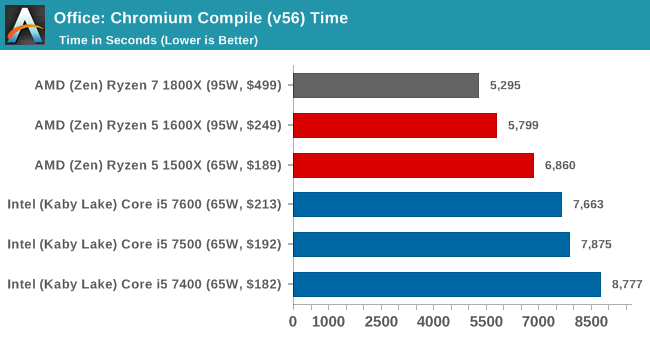
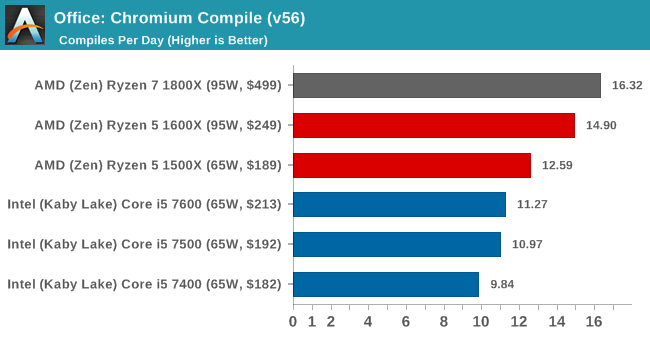
SYSmark 2014 SE
SYSmark is developed by Bapco, a consortium of industry CPU companies. The goal of SYSmark is to take stripped down versions of popular software, such as Photoshop and Onenote, and measure how long it takes to process certain tasks within that software. The end result is a score for each of the three segments (Office, Media, Data) as well as an overall score. Here a reference system (Core i3-6100, 4GB DDR3, 256GB SSD, Integrated HD 530 graphics) is used to provide a baseline score of 1000 in each test.
A note on contect for these numbers. AMD left Bapco in the last two years, due to differences of opinion on how the benchmarking suites were chosen and AMD believed the tests are angled towards Intel processors and had optimizations to show bigger differences than what AMD felt was present. The following benchmarks are provided as data, but the conflict of opinion between the two companies on the validity of the benchmark is provided as context for the following numbers.







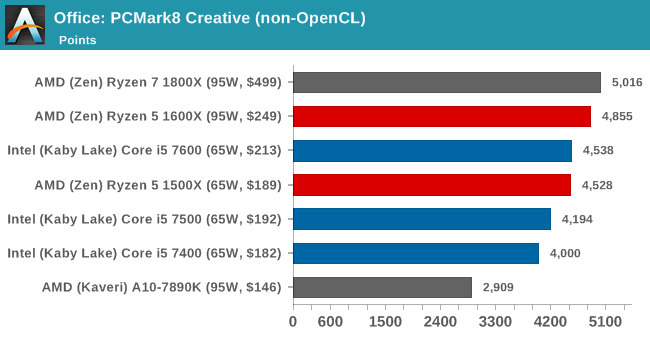
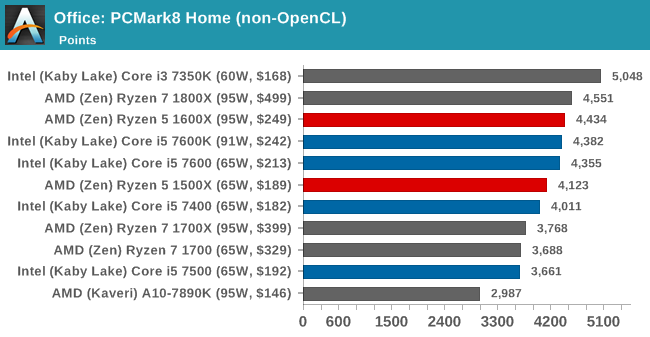
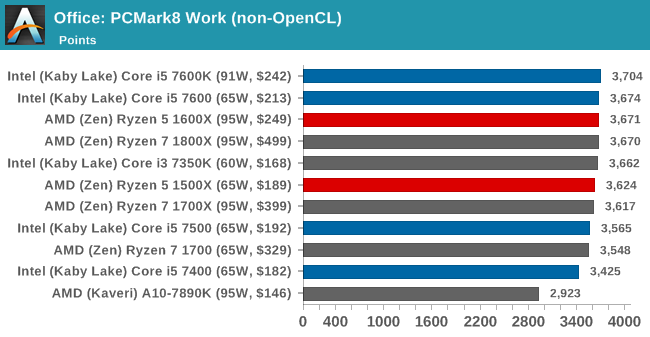








254 Comments
View All Comments
mmegibb - Tuesday, April 11, 2017 - link
Where did you get your info about OC'ing the 1600? I haven't seen much about OC'ing the Ryzen chips, at least in these initial comprehensive reviews. (I haven't searched much either). I still haven't decided between the 7600k and the 1600x, and how the 1600x overclocks will be a factor.haukionkannel - Tuesday, April 11, 2017 - link
All Ryzens in all test have been running between 3.9-4.1 in all owerclocking test. So it does not matter what Ryzen you get. The oc performance is the same. Must be because if the manufacturing proses. This could be a beast if made by intel factories ;)MrSpadge - Tuesday, April 11, 2017 - link
No, such a hard an consistent speed limit is usually by chip design. If it was "just the silicon lottery" there'd be more spread, like you see with Intels.Outlander_04 - Tuesday, April 11, 2017 - link
https://www.youtube.com/watch?v=3VvwWTQKCZsi5 and Ryzen 5 at good OC's
cheshirster - Wednesday, April 12, 2017 - link
People are already bying 1600, it runs 3.8 OC on a box cooler1600X has no room to overclock at all
cheshirster - Wednesday, April 12, 2017 - link
+1600bobbozzo - Tuesday, April 11, 2017 - link
Hi Ian, on the last page,Rise of the Tomb Raider’s benchmark is notorious for having each of its three _seconds_ perform differently
I think that should be 'scenes' not seconds.
Thanks!
mmegibb - Tuesday, April 11, 2017 - link
In the gaming benchmarks, Intel generally has higher average framerates. But, interestingly, in the 99th percentile and time-spent-under-60fps, Ryzen usually tops Intel. To me, this translates into an overall smoother and more consistent game play experience with the Ryzens. Is that right?I've been on Intel processors for years. In fact, my son still is doing heavy-duty 1080P gaming with an OC'd i5-2500k. But, soon I'm going to replace that beloved CPU, and I want to buy a Ryzen just to upset the apple cart and do something different.
I've been disappointed in the Ryzen 7 reviews as far as gaming is concerned. But, this review gives me hope. I'm really thinking that triple the threads of the i5-7600k with only a small loss of gaming performance is the way to go. Especially with DX12 getting more common.
Achaios - Tuesday, April 11, 2017 - link
Αs a gamer, what you are primarily interested in is Single Threaded Performance simply because there's a host of games out there that depend on Single Threaded performance:1. All World of Warcraft versions.
2. All Total War versions.
3. Starcraft II.
4. Civilization games.
...and so on. The OP is just giving you a review tailored to make Ryzen shine whereas in fact it still is an inferior CPU for gaming due to inferior Single Threaded performance.
Very few games use for than 2-4 Cores, so that makes Ryzen largely irrelevant at the moment. It will also be irrelevant in the future too when games will begin utilizing more than 4 cores, because there will be -by then- far better Intel & AMD processors.
mmegibb - Tuesday, April 11, 2017 - link
Yes, forever gaming reviews have hammered the idea that all that matters is single threaded performance.However, as I mentioned, this review shows the 1600x beating the 7600 in 99th percentile and time under 60fps, even in games like GTA V. Those are very important benchmarks for gaming quality perception. You didn't talk to that at all. You just repeated the boilerplate about "single core" that we all know.
Also, I don't think it will be too far in the future when more games use DX12, and that seems to make a big difference.
I think I'm getting a whiff of "intel-fanboy" from your post.